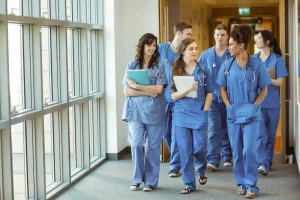A typical day in the life of a junior doctor

Once you graduate from medical school you become a junior (now called ‘resident’) doctor, specifically a Foundation year 1 doctor. (F1, or FY1) You are assigned to a ward, where you will be involved in the care of the patients there.
There is significant variation in the work between specialties, but there are also some common themes that link the majority – and that is what we will focus on here.
The two most notable outliers are if you are working in a Accident and Emergency or in a GP practice.
But for the rest, the broad template is as follows:
08:00. Arrive on the wards and morning handover
The day starts off by the night team (of junior doctors) handing over to the day team.
The doctors who have been working overnight will tell the day team about any patients who have been particularly sick or deteriorated over the night.
They will also highlight any blood tests or scans that have been requested but the results have not come back yet – this is so the day team can keep chase them up.
08:30. Ward round
Conduct a ward round with senior doctors (usually a registrar or consultant). You check in on your patients on the ward. You main role is to listen carefully, and write down what the seniors say.
You also play a part in clinical decisions and should create a list of jobs (as you go along, separate from the patients’ notes) such as:
- Doing bloods
- Organising tests (especially x-rays and scans)
- Talking to families
- Organising discharges. There are two main tasks:
- Tablets to take home
- Writing discharge summaries.
12:00. After the ward round
You need to split the jobs between yourself and your colleagues; and everyone works on completing their tasks.
During this time, nurses will contact you if they feel a patient is deteriorating and you will deal with these situations as they arise, escalating them to your senior colleagues if any becomes more serious.
13:00. Lunch
Doing the jobs (below) should not be attempted until you have had lunch (or at least a snack and a coffee) following the ward round.
So, in general, you should make a list of all the jobs that need doing from the ward round; and then try and do them later, in order of importance with your colleagues.
You may have your lunch at weekly departmental meetings (or training sessions) takes place, where they ay be food available supplied by drug companies (pizza etc).
14:00. Do the jobs
So the ward round in essence is a boss going round and deciding on a plan for every patient.
The next step for you as a junior doctor is then to enact that plan!
You are back on the wards, continuing to complete your jobs and ensuring that everyone on the ward is recuperating well and everything is running smoothly. You work hand in hand with the nursing staff.
You may speak to some patients’ relatives to update them, either in person or over the phone. These contacts are important .. and reduce the formal complaints coming your way, which will not make the bosses happy (as they have to deal with them). Write down clearly what was said.
16:00. Handover
On many wards, there is now a later pm (usually about 4pm) handover where you and your colleagues update the more senior doctors about the patients’ progress through the day.
If you have been unable to carry out a task, this is the time to tell seniors and ask for their help.
18:00. Go home
After a long day at work, you head home.
(21:00. Evening handover)
A junior doctor doing a late shift (say 1pm-9pm) may have the task of handover back to the evening/night team.
There are far fewer doctors on overnight compared with over the day so the aim is to only hand over the essentials.
Much like the morning handover but in reverse, you will highlight any patients that have been particularly sick over the day (in case they get worse overnight) and any blood tests or scans to keep an eye out for.

